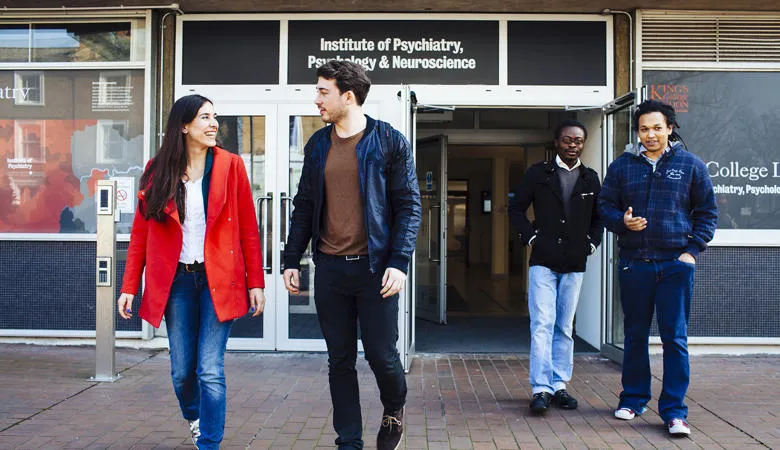Find a supervisor
Search through a list of available supervisors.

The Department of Psychological Medicine at King's College London is the largest department in the Institute of Psychiatry Psychology & Neuroscience (IoPPN). It currently has around 20 full-time academics and a total of approximately 100 members of staff. The department has approximately 50 doctoral students.
The large number of staff and students in the Department provides an environment which is very beneficial to research students because:
The Head of the Department is Professor Trudie Chalder.
The department is research-led but in addition, has a broad teaching and clinical remit. The mental health problems of particular interest are those of the common mental disorders, such as anxiety, depression, eating disorders, liaison psychiatry, military mental health, perinatal psychiatry, and stress related disorders.
Research in the Department of Psychological Medicine
There are eight major research groups in the Department. They all have an extensive research portfolios and an established record for obtaining funding and publishing research in high impact journals. The department has a well-developed framework for helping research students to:
find the most suitable supervisors
to integrate into research groups
to develop their projects
to monitor their progress
to obtain specialist help e.g. with data analysis
to obtain pastoral care e.g. to present their data at meetings
to provide guidance with thesis and viva preparation.
All of the research groups work closely with service users, their families, and healthy volunteers i.e in relation to clinical projects. The research groups are:
Affective Disorders
Diabetes and Psychiatry
Eating Disorders
General Hospital Psychiatry
King's Centre for Military Health Research
Mental Health, Ethics and Law
Stress, Psychiatry and Immunology Laboratory & Section of Perinatal Psychiatry
Trauma Studies
Research students may conduct their postgraduate studies within one of these groups or their project may go across two groups. In some cases, it could involve research with a group elsewhere in King's, for instance, in the Centre for Neuroimaging Studies. In fact, if regulatory conditions are met, the project could involve a collaboration with a group in another university or country.
Clinical Academic Groups (CAG)
To facilitate and to fund clinical academic research, Kings Health Partners has a number of clinical academic groups. Psychological Medicine as a Department is part of the Clinical Academic Group (CAG) with the same name. This CAG within King’s Health Partners seeks to cross the divide between psychiatry and medicine.
The principal research methodologies used within the department are clinical, psychological, biological (including genetics and neuroimaging) and epidemiological. These approaches include cross sectional studies, cohort studies and randomised controlled trials (RCTs).
Teaching in the Department of Psychological Medicine
In addition to research and clinical work, the department is very involved in teaching. This occurs across a wide range of programmes and specialist subject areas and in many cases is done via formal lectures.
Teaching in the department also includes structured events such as research student “showcases” (presentation of work to peers and to staff) and also debates: this means that research students develop presentation skills and become able to assess and discuss data and conclusions. These transferable skills are very important for student development both in terms of becoming “part of the dialogue of their subject area” but also as a preparation for life after their PhD.
In addition to the research associated issues described above, the teaching environment in the Department means that research students can have the opportunity to become informed on a very wide area of specialist theoretical and practical topics. For example, the Department is involved in the teaching of full time and part time Master's programmes such as the MSc in Mental Health Studies or the MSc in War & Psychiatry.
The department also hosts The Maudsley Forum, an international annual four day conference, for psychiatrists, psychologists and others interested in mental health: this gives participants the opportunity to learn about the most current advances in clinical and academic psychiatry. In addition, the department runs a series of e-interactive, popular debates on mental health issues: these attract well known speakers and are attended by service users, carers, professionals, journalists and members of the public.
Research students have access to an extensive programme of teaching related to issues such as ethics, statistics, research project design etc., and in fact, are required to attend a number of these as part of their training.
The tuition fees below are for the first year of the course. These tuition fees may be subject to additional increases in subsequent years of study, in line with King’s terms and conditions.
UK Tuition Fees 2025/26
Full time tuition fees:
£8,500 for the first year (MPhil/PhD, Psychological Medicine Research)
£8,500 for the first year (MDRes)
Part time tuition fees:
£4,250 for the first year (MPhil/PhD, Psychological Medicine Research)
£4,250 for the first year (MDRes)
International Tuition Fees 2025/26
Full time tuition fees:
£32,400 for the first year (MPhil/PhD, Psychological Medicine Research)
£32,400 for the first year (MDRes)
Part time tuition fees:
£16,200 for the first year (MPhil/PhD, Psychological Medicine Research)
£16,200 for the first year (MDRes)
UK Tuition Fees 2026/27
Full time tuition fees:
£9,100 for the first year (MPhil/PhD, Psychological Medicine Research)
£9,100 for the first year (MDRes)
Part time tuition fees:
£4,550 for the first year (MPhil/PhD, Psychological Medicine Research)
£4,550 for the first year (MDRes)
International Tuition Fees 2026/27
Full time tuition fees:
£34,700 for the first year (MPhil/PhD, Psychological Medicine Research)
£34,700 for the first year (MDRes)
Part time tuition fees:
£17,350 for the first year (MPhil/PhD, Psychological Medicine Research)
£17,350 for the first year (MDRes)

Home to the Institute of Psychiatry, Psychology & Neuroscience.
Graduate research students work closely with their supervisors and enjoy regular meetings to discuss their progress. They also liaise with other members of staff with relevant research interests and are encouraged to attend and participate in departmental research presentations and other Institute seminars. There is a full induction for new graduate students on commencing their studies. Each full-time graduate research student is allocated their own workspace and computer; facilities for part-time students can be arranged according to their needs.
What our students say
In a recent survey our PhD students reported that they have a very positive experience. On a range of measures, the scores were very gratifying:
Many factors could be contributing to the good “theme scores” seen in the student survey:
The success of the PhD programme in the Department of Psychological Medicine is reflected in the following ways:
Training courses run by the department, the Institute or through the Graduate School can be used as required to provide training in a wide variety of topics, from transferable skills to academic areas directly relevant to the student's thesis.
Professor Trudie Chalder
Professor Roland Zahn
For any additional queries regarding application and project approval procedures please contact
Education Support Team: ioppn.pgr@kcl.ac.uk
Admissions Tutor: Dr Alex Dregan - alexandru.dregan@kcl.ac.uk
Business Manager: Anai Sarkis - soap-busops@kcl.ac.uk
The tuition fees below are for the first year of the course. These tuition fees may be subject to additional increases in subsequent years of study, in line with King’s terms and conditions.
UK Tuition Fees 2025/26
Full time tuition fees:
£8,500 for the first year (MPhil/PhD, Psychological Medicine Research)
£8,500 for the first year (MDRes)
Part time tuition fees:
£4,250 for the first year (MPhil/PhD, Psychological Medicine Research)
£4,250 for the first year (MDRes)
International Tuition Fees 2025/26
Full time tuition fees:
£32,400 for the first year (MPhil/PhD, Psychological Medicine Research)
£32,400 for the first year (MDRes)
Part time tuition fees:
£16,200 for the first year (MPhil/PhD, Psychological Medicine Research)
£16,200 for the first year (MDRes)
UK Tuition Fees 2026/27
Full time tuition fees:
£9,100 for the first year (MPhil/PhD, Psychological Medicine Research)
£9,100 for the first year (MDRes)
Part time tuition fees:
£4,550 for the first year (MPhil/PhD, Psychological Medicine Research)
£4,550 for the first year (MDRes)
International Tuition Fees 2026/27
Full time tuition fees:
£34,700 for the first year (MPhil/PhD, Psychological Medicine Research)
£34,700 for the first year (MDRes)
Part time tuition fees:
£17,350 for the first year (MPhil/PhD, Psychological Medicine Research)
£17,350 for the first year (MDRes)

Home to the Institute of Psychiatry, Psychology & Neuroscience.
Graduate research students work closely with their supervisors and enjoy regular meetings to discuss their progress. They also liaise with other members of staff with relevant research interests and are encouraged to attend and participate in departmental research presentations and other Institute seminars. There is a full induction for new graduate students on commencing their studies. Each full-time graduate research student is allocated their own workspace and computer; facilities for part-time students can be arranged according to their needs.
What our students say
In a recent survey our PhD students reported that they have a very positive experience. On a range of measures, the scores were very gratifying:
Many factors could be contributing to the good “theme scores” seen in the student survey:
The success of the PhD programme in the Department of Psychological Medicine is reflected in the following ways:
Training courses run by the department, the Institute or through the Graduate School can be used as required to provide training in a wide variety of topics, from transferable skills to academic areas directly relevant to the student's thesis.
Professor Trudie Chalder
Professor Roland Zahn
For any additional queries regarding application and project approval procedures please contact
Education Support Team: ioppn.pgr@kcl.ac.uk
Admissions Tutor: Dr Alex Dregan - alexandru.dregan@kcl.ac.uk
Business Manager: Anai Sarkis - soap-busops@kcl.ac.uk
Search through a list of available supervisors.
For any additional queries regarding application and project approval procedures please contact Education Support Team: ioppn.pgr@kcl.ac.uk Admissions Tutor: Dr Alex Dregan - alexandru.dregan@kcl.ac.uk Business Manager: Anai Sarkis - soap-busops@kcl.ac.uk
Discover your accommodation options and explore our residences.
Chat to current students and staff to find out about life at King's.
Want to know more about studying at King's? We're here to help.
King's is right in the heart of the capital.